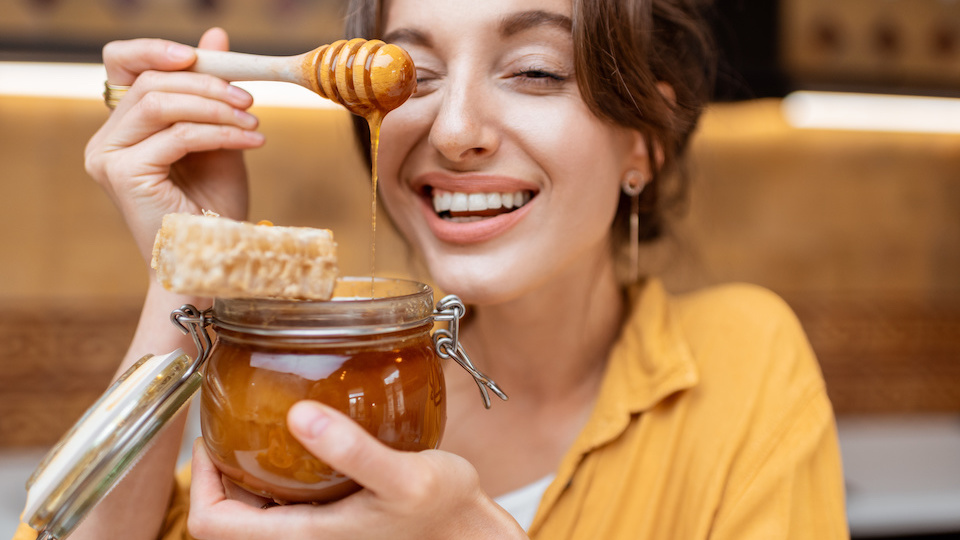Not all sweets are bad for your teeth. Honey, it seems, has real benefits for oral health, despite its high natural sugar content. However, it does act differently than refined sugar. Unlike refined sugar that causes plaque and tooth decay, honey has antimicrobial properties that actually stop plaque in its tracks and fight gingivitis. But, not all honey is created equal. Here’s how honey can improve your oral health.
Cavities, sugar vs. honey
Honey is a natural remedy that has been used since ancient times to treat infected wounds. Once again, it’s found its way into modern-day medicine. And, even more recently, into dental health. But the idea of using honey for oral health seems counterintuitive. Doesn’t sugar rot the teeth? Well, refined sugar sure can. So, what’s the difference? Frequently snacking on sugar-dense processed foods or sipping beverages like soda, sports drinks, juices, and even flavored waters can cause teeth to decay. These expose your teeth over and over again to acid attacks, according to the American Dental Association (ADA). In fact, each time you eat or drink anything sweet, your teeth are under acid attack for up to one hour, says the Oral Health Foundation.
For bacteria to cling to your teeth, it creates a substance called dextran, the foundation of plaque. Plaque, the soft, sticky film that builds up on teeth, houses millions of bacteria. Each time you consume sugary foods and beverages, the bacteria in the plaque use those sugars to produce acids, which eat away at the tooth enamel. Too many attacks and your tooth enamel starts to break down, eventually resulting in a hole on the tooth surface. Thus, a cavity is born.
Honey, on the other hand, seems to have the opposite effect. Certain types of honey are useful to fight cavities because of their antimicrobial strength. When honey is mixed with water, an enzyme in the honey produces hydrogen peroxide, a known antiseptic. The creation of hydrogen peroxide is the main reason for its antimicrobial activity. Honey kills the bacteria, which reduces the amount of acid produced, therefore preventing cavities.
Honey prevents gingivitis
When plaque is not brushed or flossed away from between the teeth daily, it eventually hardens, turning into tartar. And, as tartar hardens and collects at the gum line, brushing and flossing become more difficult. Soon, the gum tissue swells, becomes red, recedes, and likely bleeds when the teeth are brushed. This is how gingivitis takes hold — an early stage of periodontal disease.
Gingivitis is an epidemic, with 95 percent of adults inflicted with it at some point in their lives. If it becomes severe enough, your teeth will start to move out of place due to the inflammation that is caused by the bacteria thriving in an oral cavity. Therefore, the best way to prevent gingivitis is to get rid of the bacteria. This is where honey comes in. A study from Egypt looked at honey and its ability to kill bacteria in plaque. Honey was compared with sucrose or sorbitol, and its antibacterial activity was compared with commonly used antibiotics. Researchers concluded that honey could be used as an alternative to traditional-type remedies for the prevention of gingivitis.
All honey is not created equal
Sure, all honey comes from bees. But, the type of honey, or even how it’s processed, can make a difference in oral health. Most of the commercial honey sold in the U.S. is refined or processed, which unfortunately means — like all processed foods — that it can damage your health. So, it’s important to know what honey is healthy and what is not-so-healthy.
Hundreds of millions of pounds of honey are consumed each year in America. So, it’s hard for producers to keep up the demand, which is why honey is also imported into the U.S. However, according to research, with imported honey comes serious concerns about it being contaminated with sweeteners like high fructose corn syrup to meet demands. This is not what you need for good oral health.
What you do need is raw, local honey for your teeth and gums. Local is best because it assures it has never been tampered with. According to research, raw honey is extracted from honeycombs and then poured over a nylon or mesh cloth to separate impurities like beeswax and dead bees from the honey. Stay away from honey that’s labeled as ultrafiltrated. Honey that has been ultrafiltrated is void of beneficial properties like nutrients, vitamins, micronutrients, and antioxidants. It may also contain sugary-type additives.
Manuka honey for oral health
Another great honey for oral health is Manuka honey. This honey is sourced from the nectar of the manuka tree, which is native to New Zealand and Australia. Studies suggest that Manuka honey has an even greater antibacterial effect on oral bacteria than raw honey. In addition, Manuka honey is also more effective in inhibiting gingivitis. But, keep in mind, Manuka is typically pricier than local honey.
How to use honey as an antiseptic mouthwash
To help prevent tooth decay and gingivitis, a study was conducted using two mouthwashes — one made with raw honey and the other with manuka honey. The study concluded that both types of honey made an effective mouthwash and substantially reduced inflamed gums associated with periodontal disease. Simply mix about one teaspoon of raw or manuka honey in about half a cup of water and swish around your mouth. Your gums and teeth with thank you!
-The UpWellness Team









